Among current website builders, Shopify vs Weebly is undoubtedly a popular comparison for new merchants looking to open a new store. They are both user-friendly eCommerce solutions with many competitive advantages over each other, and are great for beginners with little technical skill.
There are clear pros and cons between these platforms, so the suitable choice will depend on your business’ requirements and preferences. In this article on Shopify vs Weebly, LitCommerce will compare the two platforms’ key differences to help you find which is the better fit for you using these main points:
- The main differences between Shopify vs Weebly
- Which is the more suitable platform for you
- Frequently asked questions about Shopify vs Weebly
Read on and find out!
Shopify vs Weebly: Main Differences Analyzed
1. Ease of use
When it comes to ease of use between Shopify vs Weebly, both platforms are known for being great choices for starters. This means new merchants won’t have to worry about spending too much time and effort to set up and manage their online store.
Shopify ease of use
Shopify is widely regarded as one of the most easy-to-grasp eCommerce platforms on the market. Its user interface is clean and intuitive, and the setup process includes just a few straightforward questions. You’ll have a functional store up and running in no time at all. The platform also offers a range of built-in features that make it easy to manage an online business.
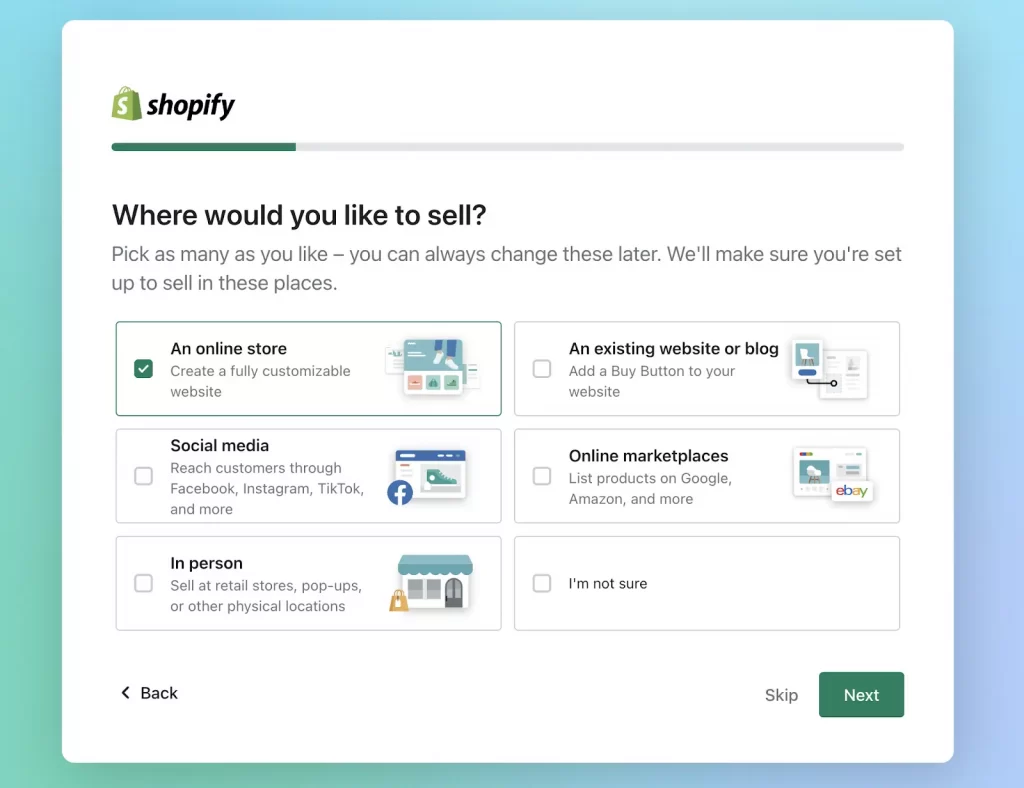
Weebly ease of use
On the other hand, Weebly’s ease of use lies in its drag-and-drop interface, which is suitable even for those with little to no technical expertise. You can easily interact with website elements and move them where you want to design a storefront to your liking. The platform is designed to be beginner-friendly, with all the tools and features you need to get started with eCommerce.
Shopify vs Weebly – Final verdict for ease of use: Shopify and Weebly are both user-friendly eCommerce solutions, with hassle-free setup processes and straightforward interfaces.
2. Pricing plans
Shopify pricing plans
Regarding pricing, Shopify provides a 3-day free trial when you create a new store, and 3 months of use at only $1 per month. This is an advantage to new sellers who want to figure out if this platform is suitable or not. Afterwards, merchants will need to pay a monthly subscription fee and choose among 3 Shopify pricing plans:
- Basic Shopify plan: $39 per month, offers you a standalone website with an eCommerce store and a blog.
- Shopify plan: $105 per month, allows you to create a more powerful store with robust selling functions.
- Advanced Shopify plan: $299 per month, suitable for midsize to large businesses.
Shopify also provides a Shopify Starter plan at only $5/month to let you start selling as quickly as possible. However, this plan will be more limited in accessible features, compared to the main plans above. Moreover, to cater to the needs of larger and enterprise-level businesses, Shopify also offers the Shopify Plus plan. This is an effective solution for scaling and converting customers.
If you choose to subscribe to a yearly Shopify plan, you can save 25% compared to the monthly subscription price.
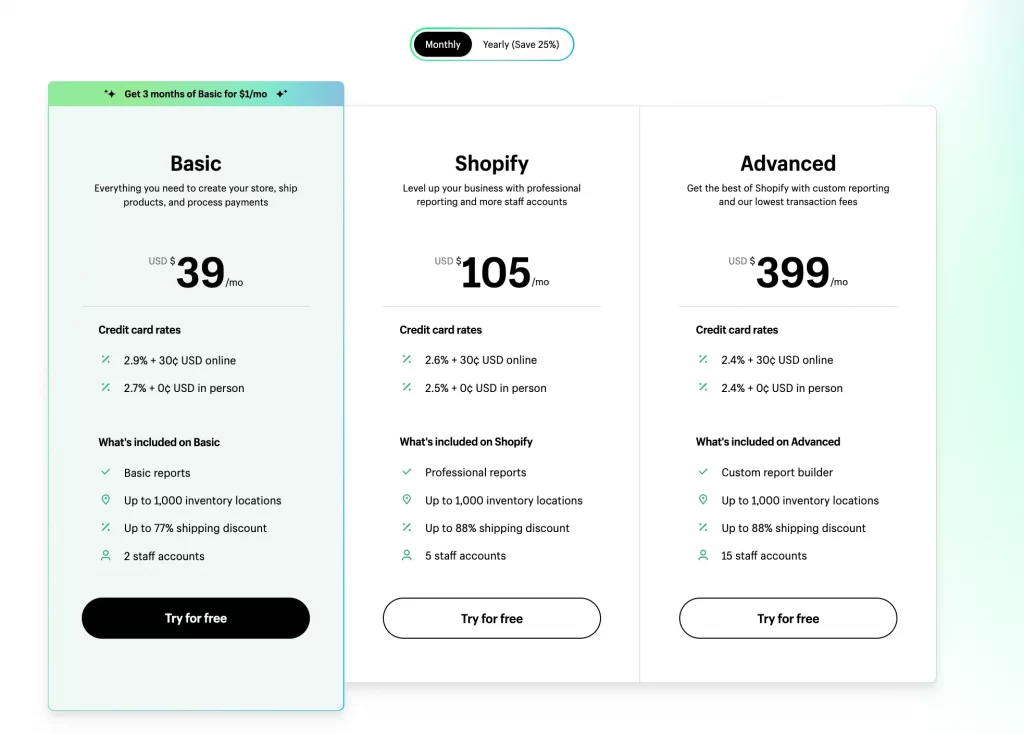
Weebly pricing plans
On the other hand, Weebly provides merchants with 4 pricing options, including a free plan and three affordable subscription packages.
Be mindful that the free plan will have restrictions on which features you are able to access, as well as the fact that you can only sell 10 products and aren’t allowed to use your own domain name. Other than that, this option can equip you with sufficient features to launch a website.
Here are the detailed price for Weebly’s paid plans:
- Personal Plan: starting at $10 per month, includes a free custom domain name, unlimited products, and the ability to connect a payment gateway.
- Professional Plan: starting at $12 per month, adds features like abandoned cart recovery and shipping discounts.
- Performance Plan: starting at $26 per month, includes advanced eCommerce features like inventory management and real-time shipping rates.
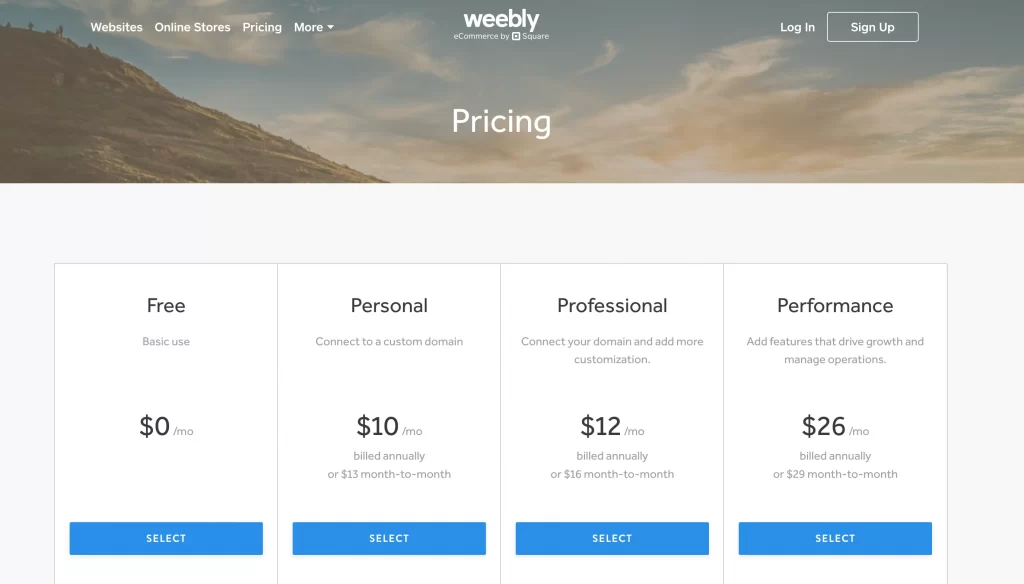
These prices are applied if you opt for a yearly subscription, so the month-to-month pricing can differ.
Shopify vs Weebly – Final verdict for pricing: Both Shopify and Weebly offer multiple pricing options to suit different needs and budgets. While Shopify may be more expensive, it offers a wider range of advanced features that can help you scale your business. Weebly, on the other hand, may be a more affordable option for smaller businesses or those just starting out.
3. Design and customization
When it comes to building an online store, design and customization are crucial to creating a unique and professional-looking website. Both Shopify and Weebly can offer easy design options and customization features, but how do they compare?
Shopify design and customization
Let’s start with Shopify. This platform offers over 110 professional-looking themes on the Shopify theme store, both free and paid. Shopify themes are fully customizable, allowing you to change everything from the color scheme to the layout to match your branding. You can edit the HTML and CSS of your theme to create a truly unique look.
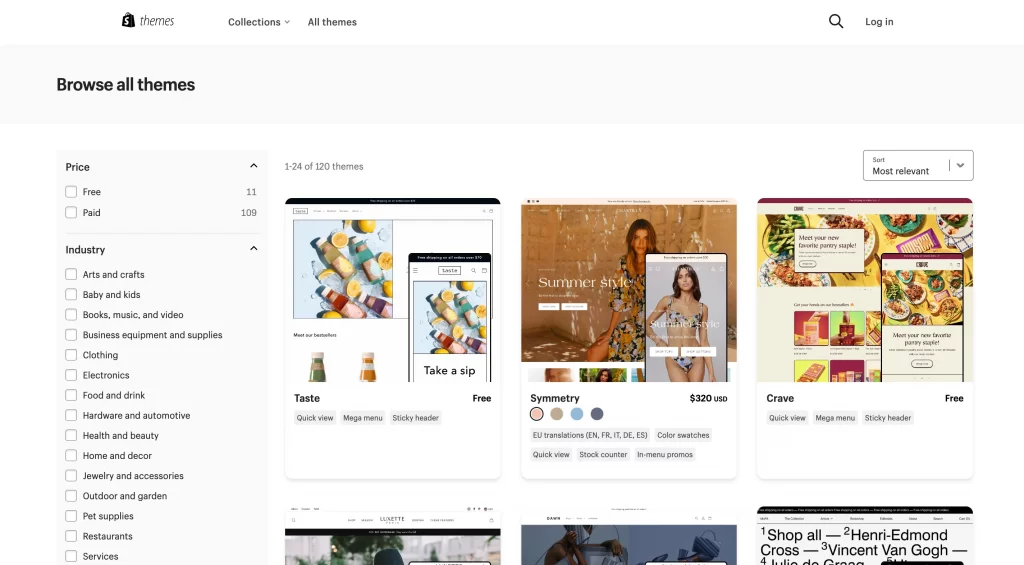
Shopify also offers a drag-and-drop builder, making it easy to customize your site without any coding knowledge. In addition, Shopify has a large marketplace of apps and plugins that can add even more design and customization options to your online store.
Weebly design and customization
Now, let’s take a look at Weebly’s design and customization features. Weebly also offers 60+ professionally-designed themes on the Weebly theme store, with 15 themes specifically made for eCommerce businesses. All themes are customizable through a drag-and-drop builder.
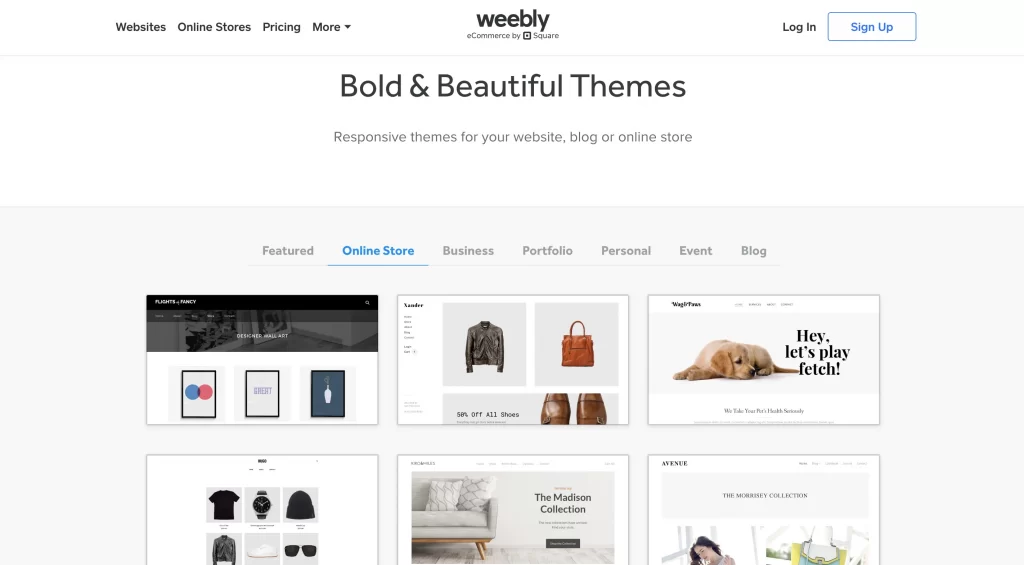
Weebly also provides advanced customization options, such as the ability to edit the HTML and CSS of your site, but these require more technical knowledge. In terms of plugins and apps for added designing functions, Weebly’s marketplace is not as large as Shopify’s, but there are still some useful tools available.
Shopify vs Weebly – Final verdict for design and customization: Overall, both Shopify and Weebly offer easy-to-apply design and flexible customization options, but Shopify’s wider range of themes and apps give it an edge in terms of visual appeal and flexibility.
4. eCommerce features
Shopify and Weebly both give users a diverse range of tools to help them manage their online store.
Shopify eCommerce features
For the record, Shopify is widely known for its robust eCommerce features, including a built-in payment gateway, unlimited product listings, and powerful inventory management tools. Shopify eCommerce features also include advanced functionalities such as abandoned cart recovery, gift cards, and custom discount codes.
Additionally, Shopify has one of the largest apps and plugins marketplaces that can add even more eCommerce functionality to your site. There are currently more than 6000 apps within the Shopify app store. With Shopify assistance, you can conveniently manage your store from your mobile device with their app.
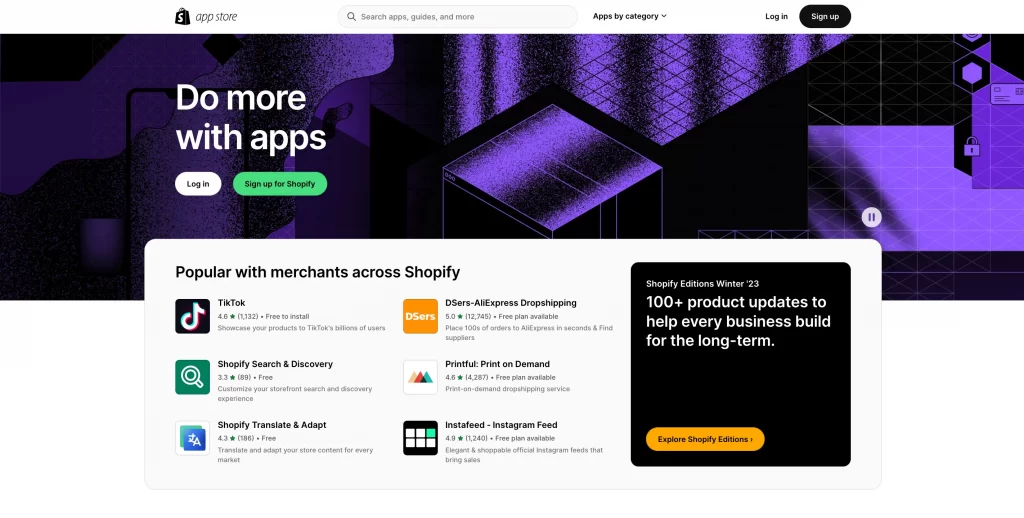
Weebly eCommerce features
While they may not be as robust as Shopify, Weebly eCommerce features are still sufficient and diverse. These include the ability to sell digital products, real-time shipping rates, and inventory management. Weebly also offers abandoned cart recovery and the ability to create custom discount codes. However, some advanced features, such as gift cards and custom checkout pages, are only available on Weebly’s more expensive plans.
At the same time, Weebly gives its users full access to the Weebly app center, with over 380 free and paid apps to choose from. These are available in multiple categories for your easy selection – eCommerce, Communication, Marketing, Social or Site Tools and Features.
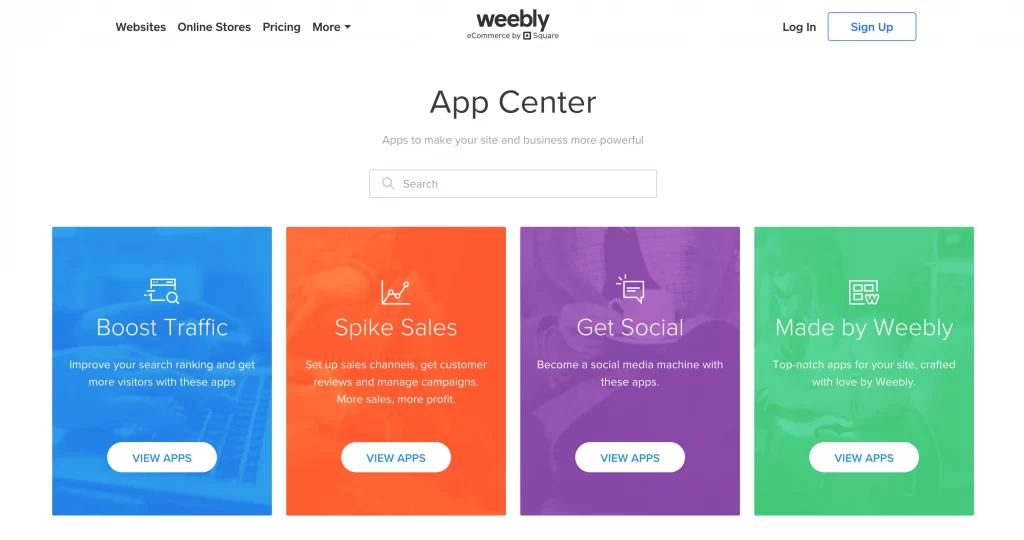
Shopify vs Weebly – Final verdict for eCommerce features: Shopify’s advanced features and greatly diverse marketplace of apps give it a better advantage over Weebly when it comes to eCommerce functionality.
5. Marketing features
Shopify marketing features
Shopify provides users with an abundance of marketing tools to help them attract more visitors and increase their conversion rate. Email marketing, social media integration, and Google Ads are a few features worth the mention. With numerous apps and third-party integrations to make use of, you can certainly run effective campaigns and promote your brands on multiple channels.
In terms of Shopify SEO, this eCommerce platform has a built-in blog feature as well, which you can use to create SEO-friendly content and drive organic traffic to your website. You can also optimize your site for search engines using customizable meta tags and descriptions, automatic sitemaps, and Google Analytics integration. However, Shopify’s URL structure isn’t completely customizable. Moreover, it can be quite complex to create sub-categories, which can be an SEO drawback for some.

Weebly marketing features
As a store builder, Weebly also has a similar range of marketing tools for email marketing, social media integration, and Facebook Ads. Also, Weebly focuses on email marketing as an effective way for merchants to prompt a purchase. Store owners can take advantage of Weebly Promote, a complete email marketing service that lets you make email marketing simple with templates and customization features.
Weebly’s blogging feature is also SEO-friendly. The product pages and content pages are optimized to help you rank better on search engines. Other Weebly SEO functionalities, such as customizable URLs, image alt tags, or mobile responsiveness, are also worth the mention.
Shopify vs Weebly – Final verdict for marketing features: Both Shopify and Weebly offer solid marketing features – including SEO – that can help you promote your online store. However, Shopify takes the win for its robust built-in tools and diverse marketing apps, as well as third-party integration.
6. Security
When it comes to running an online store, security is one of the most important factors to consider when you choose a platform.
Shopify security
Shopify provides its users with a secure shopping cart, SSL encryption, and fraud analysis tools. Additionally, Shopify is Level 1 PCI compliant, which means they meet the highest level of security standards for processing credit card payments. Shopify also has a dedicated team of experts that monitor security threats and implement measures to keep your site safe.
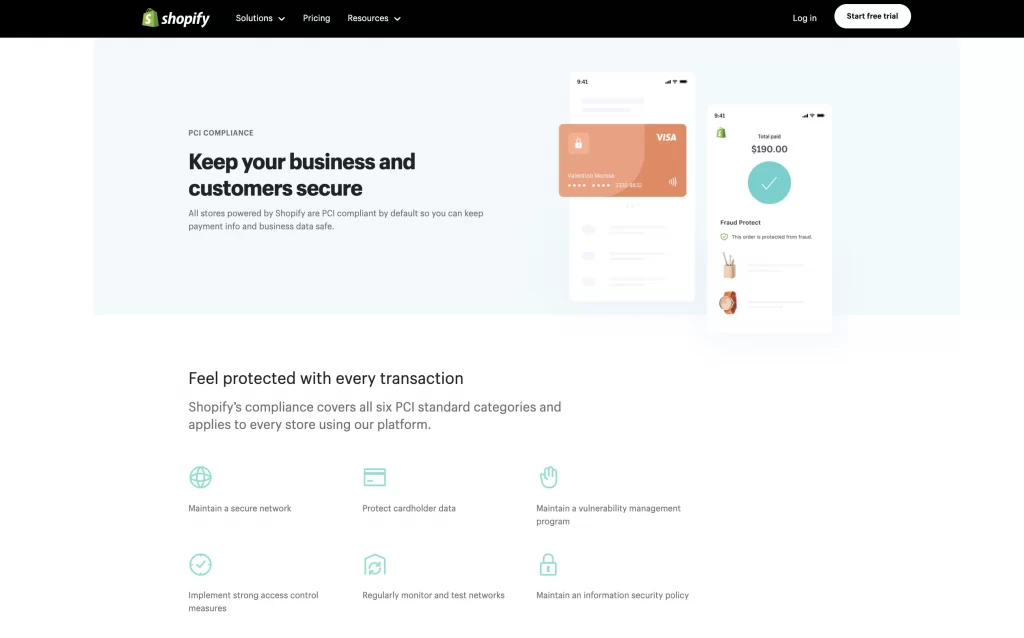
Weebly security
Weebly also provides SSL encryption and a secure shopping cart, as well as PCI compliance for processing credit card payments. Other security measures such as DDoS mitigation and brute force protection are included as well. In addition, Weebly provides daily backups and disaster recovery services to ensure that your website and customer data are always safe.
Shopify vs Weebly – Final verdict for security: Shopify and Weebly both take website security seriously and offer multiple measures to protect your website and customers’ information.
7. Customer support
Regarding this final aspect of our Shopify vs Weebly comparison, let’s take a look at how these two platforms compare.
Shopify customer support
Shopify has a support team available 24/7 for phone, email, and live chat support. The platform also equips merchants with a knowledge hub containing helpful articles and tutorials, as well as a community forum where you can connect with other Shopify users. For enterprise-level users, Shopify offers a range of paid support options, such as Shopify Experts and a Shopify Plus support team.
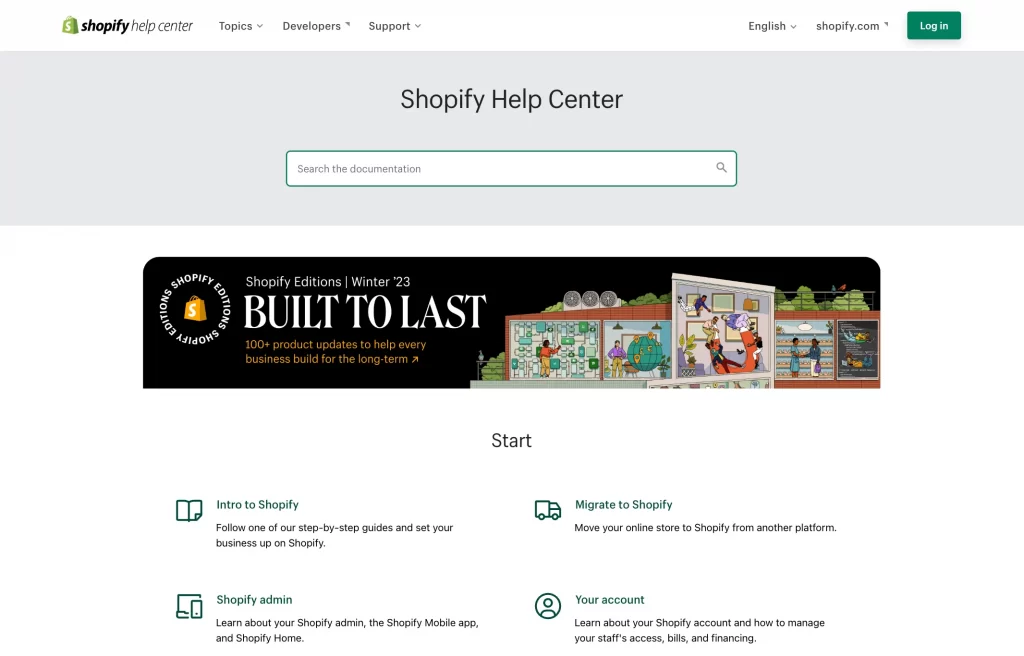
Weebly customer support
On the other hand, Weebly provides customer support via email and live chat as well, but they do not offer phone support. They also have a knowledge base with articles and tutorials, as well as a community forum where you can connect with other Weebly users. Weebly also provides a range of paid support options, such as for website design and SEO services.
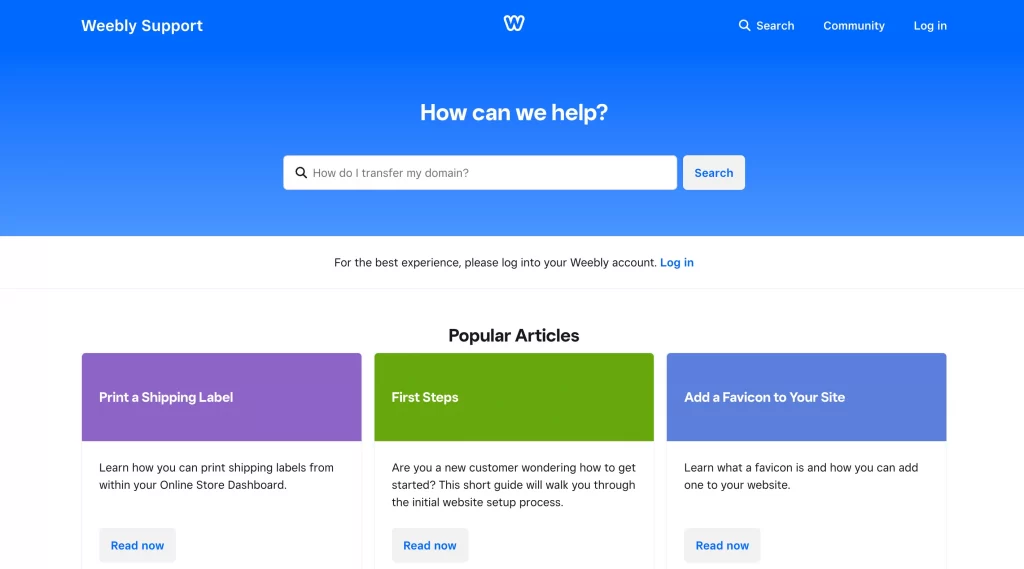
Shopify vs Weebly – Final verdict for security: Having access to reliable and responsive customer support can be crucial. When compared between Shopify vs Weebly, both platforms provide dedicated help from support centers and knowledge hubs. But Shopify’s 24/7 phone support, paid support options as well as its active user community is the clear winner.
Shopify vs Weebly: Which Platform Should You Choose?
Deciding between Shopify and Weebly ultimately comes down to your specific needs and priorities as an online store owner. Both platforms offer robust eCommerce features to help you create and grow your online store. However, there are a few key differences that may make one platform a better fit for your business than the other.
If you prioritize flexibility and customization, Shopify might be the right choice for you. With a wide range of templates and apps, as well as advanced design and coding options, Shopify allows you to create a highly customized online store that meets your unique needs. So if you’re a business that needs more advanced eCommerce features and support, Shopify’s professional offerings are the better fit.
On the other hand, if you prioritize simplicity and ease of use, Weebly will be the suitable option. With a drag-and-drop website builder and intuitive interface, Weebly is easy to navigate and can be set up quickly. Thus, if you’re a smaller business or just starting out with eCommerce, Weebly’s lower pricing and straightforward eCommerce features might appeal to you more.
By evaluating your specific needs and priorities and comparing the features and benefits of each platform, you can choose the one that’s right for your business.
Shopify vs Weebly: FAQs
The main difference between Weebly and Shopify is their focus. Weebly is a website builder that offers eCommerce capabilities, while Shopify is primarily an eCommerce platform that also offers website building tools. Weebly is designed to be easy to use and is ideal for small businesses or those just starting out with eCommerce, while Shopify offers more advanced features and support, making it better suited for businesses with more complex eCommerce needs. While Weebly and Shopify are separate platforms, you can integrate them together using third-party apps. This allows you to use Weebly’s website building tools in conjunction with Shopify’s eCommerce capabilities, giving you more flexibility and customization options. Shopify’s biggest competitor in the eCommerce platform space is currently WooCommerce, which is a free, open-source plugin for WordPress. WooCommerce is known for its flexibility and customization options, making it a popular choice for small businesses and entrepreneurs. Weebly does not take a percentage of sales from your online store. Instead, they offer a range of pricing plans with flat monthly fees, which include eCommerce features such as payment processing and shipping integrations. However, some payment gateways and third-party apps may charge transaction fees, so it’s important to read the fine print before selecting these options.
Final Thoughts
Choosing the right eCommerce platform for your business is a critical decision that requires careful consideration of the available options. Shopify and Weebly are two popular platforms that offer a wide range of features and benefits. However, Shopify vs Weebly have their own unique strengths and weaknesses, making one platform more suitable for certain businesses than the other.
Whether you are a small business just starting out or a large enterprise with complex eCommerce needs, both Shopify and Weebly have the right tools and resources to help you grow. By taking the time to research and compare your options, you can make an informed decision that sets you up for success in the ever-changing world of eCommerce.
If you are looking for more informative articles like this, come and check out our Retail Blog. Enjoy reading, and happy selling!



